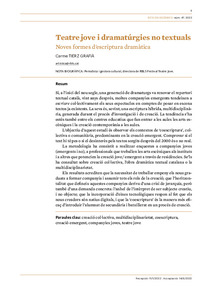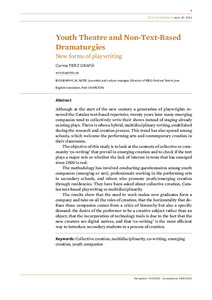| dc.contributor.author | Tierz Grafià, Carme | |
| dc.date.accessioned | 2022-12-31T12:59:47Z | |
| dc.date.available | 2022-12-31T12:59:47Z | |
| dc.date.issued | 2022 | |
| dc.identifier.issn | 2385-362X | |
| dc.identifier.issn | 0212-3819 | |
| dc.identifier.uri | http://hdl.handle.net/20.500.11904/1513 | |
| dc.description.abstract | <p>Si, a l’inici del nou segle, una generació de dramaturgs va renovar el repertori textual català, vint anys després, moltes companyies emergents tendeixen a <em>escriure </em>col·lectivament els seus espectacles en comptes de posar en escena textos ja existents. La seva és, sovint, una escriptura híbrida, multidisciplinà· ria, generada durant el procés d’investigació i de creació. La tendència s’ha estès també entre els centres educatius que fan entrar a les aules les arts es· cèniques i la creació contemporània a les aules.</p><p>L’objectiu d’aquest estudi és observar els contextos de ‘coescriptura’, col· lectiva o comunitària, predominants en la creació emergent. Comprovar si el text hi té pes o si el desinterès pels textos sorgits després del 2000 és o no real. La metodologia ha consistit a realitzar enquestes a companyies joves (emergents i no), a professionals que treballen les arts escèniques als instituts i a altres que potencien la creació jove/ emergent a través de residències. Se’ls ha consultat sobre creació col·lectiva, l’obra dramàtica textual catalana o la multidisciplinarietat.</p><p>Els resultats acrediten que la necessitat de treballar empeny els nous graduats a formar companyia i assumir tots els rols de la creació; que l’horitzontalitat que defineix aquestes companyies deriva d’una crisi de jerarquia, però també d’una demanda concreta: l’anhel de l’intèrpret de ser subjecte creatiu, i no objecte; que la incorporació d’eines tecnològiques respon al fet que els nous creadors són natius digitals, i que la ‘coescriptura’ és la manera més eficaç d’introduir l’alumnat de secundària i batxillerat en un procés de creació. <strong> </strong></p> | |
| dc.description.abstract | <p>Although at the start of the new century a generation of playwrights renewed the Catalan text-based repertoire, twenty years later many emerging companies tend to collectively <em>write </em>their shows instead of staging already existing plays. Theirs is often a hybrid, multidisciplinary writing, established during the research and creation process. This trend has also spread among schools, which welcome the performing arts and contemporary creation in their classrooms.</p><p>The objective of this study is to look at the contexts of collective or community ‘co-writing’ that prevail in emerging creation and to check if the text plays a major role or whether the lack of interest in texts that has emerged since 2000 is real.</p><p>The methodology has involved conducting questionnaires among youth companies (emerging or not), professionals working in the performing arts in secondary schools, and others who promote youth/emerging creation through residencies. They have been asked about collective creation, Catalan text-based playwriting or multidisciplinarity.</p><p>The results show that the need to work makes new graduates form a company and take on all the roles of creation; that the horizontality that defines these companies comes from a crisis of hierarchy but also a specific demand: the desire of the performer to be a creative subject rather than an object; that the incorporation of technology tools is due to the fact that the new creators are digital natives, and that ‘co-writing’ is the most efficient way to introduce secondary students to a process of creation.</p> | |
| dc.relation.ispartof | Estudis escènics: quaderns de l'Institut del Teatre. 2022, Núm. 47 | |
| dc.title | Teatre jove i dramatúrgies no textuals. Noves formes d'escriptura dramàtica | |
| dc.type | Article | |
| dc.date.updated | 2022-12-31T12:59:48Z | |
| dc.rights.access | Open Access | |



